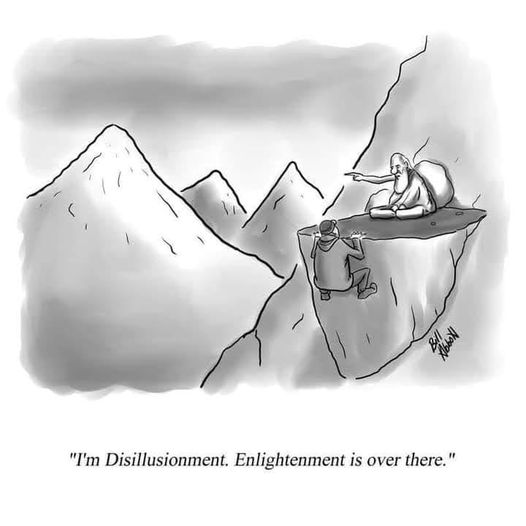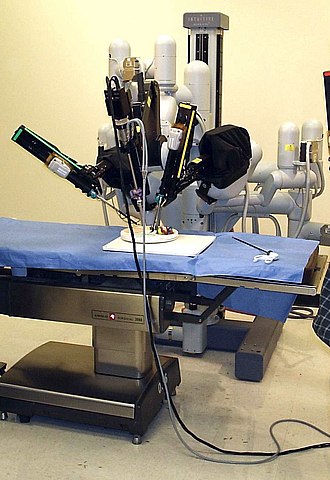|
Positive Disillusionment
To actually become Adi Da's devotee and fully take up the Way of Adidam, one also has to go through a process Adi Da calls "positive disillusionment".[1] We are born here with karmic patterns and forces that powerfully drive us to continue in our ordinary destiny, lifetime after lifetime.[2] In order to participate in a Greater Destiny, we must not only find the Guru, who makes such a Greater Destiny available (and recognize Him as a "Spiritual Transmitter" of such a Greater Destiny); we must also become dis-illusioned with our ordinary destiny and whatever keeps attracting (and binding) us to it. Without going through such a dis-illusionment process, we might formally become Adi Da's "devotee", but we won't actually progress in the Way of Adidam, because, as Adi Da once put it, we'll have one "foot" in spiritual life and one "foot" in the world, and the bigger "foot" will be the worldly one.
I remember a particular moment which epitomized that process of positive disillusionment in my own life. I was at "the top of my game". It was 1989. I was a world leader in my special area of Artificial Intelligence (AI).[3] I was an award-winning teacher, and I and my Ph.D. students were making breakthroughs in the hot new area of knowledge compilation, where you can describe what you want a software program to do, and the AI system writes a program to do that.[4] We had papers in all the major AI conferences, and I was constantly being called upon to lead workshops, edit books about my field, be on the editorial board of major journals, etc. We all sensed that AI would emerge as one of the leading areas of interest in the world in the coming years,[5] and being leaders and pioneers in a potentially world-transforming field was very exciting. In short, from a spiritual perspective, it was the kind of worldly success that could keep me karmically bound for lifetimes! I recall an afternoon when I found myself heading toward a bar in a classy hotel in Orlando, Florida. I was the "program chair" for all the engineering and manufacturing papers being presented at one of the major annual AI conferences: the Conference on AI Applications. And I was joining my fellow conference organizers for a pre-conference drink. I felt like I had "made it", and was meeting up with the members of a very "elite" club that afternoon — and was now one of them. I entered the bar, and saw the chairman of the program committee sitting there. We waved and smiled at each other across the room, and then I sat down at the bar with him and joined him for a drink. We made small talk for a while about the conference, and our lives altogether, and then fell silent, sipping our drinks. I sat there and, in the deepening silence, I was able to take a good, long look at the man. I suddenly realized: he was miserable! And his face mirrored my own unhappiness. For all our accomplishments, for all our success, we weren't happy. Not very. Not really. In all those years, there were a few pleasurable moments when we basked in the recognition of our peers, or, outside our careers, we shared some enjoyable times with our family and friends, or were blessed with some relatively rare personal moments of peace or illumination. But, as the old song goes: is that all there is? I knew from my study of Adi Da's Teaching, and my growing intuition of the nature of Reality based on my growing response to Him, that the answer was a resounding NO! But, even knowing this, how easy it would be to let my life continue to slide by rapidly, in effect (if not by intention), just settling for the modest pleasures and successes of conventional life, and never actually Realizing anything greater . . . and then we die. That moment, and what that man's face revealed to me about my own limited, karmic destiny, were the culmination of a longterm process of positive disillusionment with conventional life that had been going on for years, ever since the crisis of faith I had experienced at Columbia University. I would eventually leave the academic world a few years later, when Adi Da invited me to do so, to serve His Work instead. But in some sense, my emotional and psychic departure truly began in that moment. That dis-illusionment with the karmic path of my life was "positive dis-illusionment" in exactly the sense Adi Da meant that phrase: it freed me up for a Greater Alternative. . . becoming Adi Da's devotee and practicing the Way of Adidam.
|
||||||||||||||||||||||||||||||||||||
| Quotations
from and/or photographs of Avatar Adi Da Samraj used by permission of the copyright
owner: © Copyrighted materials used with the permission of The Avataric Samrajya of Adidam Pty Ltd, as trustee for The Avataric Samrajya of Adidam. All rights reserved. None of these materials may be disseminated or otherwise used for any non-personal purpose without the prior agreement of the copyright owner. ADIDAM is a trademark of The Avataric Samrajya of Adidam Pty Ltd, as Trustee for the Avataric Samrajya of Adidam. Technical problems with our site? Let our webmaster know. |

